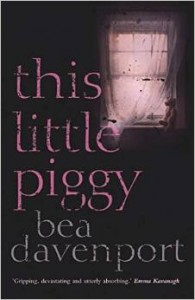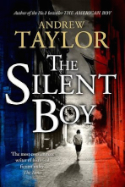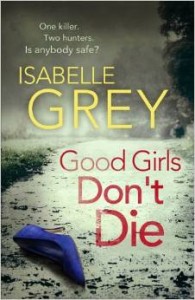 This Little Piggy by Bea Davenport, published by Legend Press
This Little Piggy by Bea Davenport, published by Legend Press
The Silent Boy by Andrew Taylor, published by HarperCollins
Good Girls Don’t Die by Isabelle Grey, published by Quercus
I Can’t Begin To Tell You by Elizabeth Buchan, published by Penguin/Michael Joseph
Moral choices are the crucial element in intelligent crime fiction. Pitting pure goodness against pure evil may allow for breathless thrills but engages neither the reader’s heart nor brain. When the moral choices concern the safety of children they are even more powerful.
Bea Davenport faces her main character, journalist Clare Jackson, with a whole series of dilemmas in This Little Piggy, as she investigates the death of a nine-month-old baby on a desperate housing estate during the 1984 miners’ strike. Clare recently missed out on promotion because a private emergency prevented her appearing at the interview, which means she has to watch her bumbling supplanter take credit for her own excellent work. Professional pride soon gives way to personal involvement as she explores the inaptly named Sweetmeadows Estate and gets to know its residents.
The baby’s father is a scab and his suicidal mother is the police’s main suspect. The only possible witness to the infant’s death is another child, Amy. Nine years old, Amy is clever and so needy that she is ready to say anything to manipulate an adult who shows an interest in her. Clare has to pick her way through the thickets of lies and half-truths Amy creates, while analyzing the evidence and deciding which of the competing adults from the estate and its adjacent colliery she can trust. One or two of the twists are a little more obvious than they need to be, but this well written novel is both engaging and heartbreaking.
The child at the centre of Andrew Taylor’s The Silent Boy is ten-year-old Charles, who has not spoken since his mother’s death during the French Revolution. She was the  estranged wife of Edward Savill, the hero of Taylor’s last novel, The Scent of Death, which won the 2013 CWA Historical Dagger. Like all Taylor’s historical novels, that was superbly researched and beautifully written without either false notes or anachronisms. The Silent Boy is even more appealing with the central figure of the threatened child, who will not speak.
estranged wife of Edward Savill, the hero of Taylor’s last novel, The Scent of Death, which won the 2013 CWA Historical Dagger. Like all Taylor’s historical novels, that was superbly researched and beautifully written without either false notes or anachronisms. The Silent Boy is even more appealing with the central figure of the threatened child, who will not speak.
The reader is made privy to most of Charles’s thoughts as he struggles to make sense of the life into which he has been propelled by a group of his mother’s friends, who have taken him to a house in England. He knows he must say nothing, he is tormented by the gardener’s boy, and he cannot work out which of the adults he should trust. His only friend is Louis, an imaginary character he has invented to fit a plaster mould of a dead boy in the possession of an emigré doctor, living in the same house.
Savill arrives to take over Charles’s care, as his legal though not his biological father, but he is frustrated by other interested parties. While nothing like as vulnerable as the boy, Savill has his own emotional battles to fight, and practical ones too. As the novel moves from the English countryside to London and Charles disappears, it begins to seem that there can be no happy ending. This is a wonderful novel, confident, moving, and beautifully constructed.
Children may reach legal adulthood at eighteen but, as DS Grace Fisher of the Essex police thinks in Isabelle Grey’s Good Girls Don’t Die, ‘With their high-tech toys and party drinks, most students weren’t much more than kids, after all. She certainly hadn’t been anywhere near as grown-up as she’d optimistically imagined she’d been at that age.’ Grace  is investigating the disappearance of Polly Sinclair, after a night of post-exam celebrating in her university town. Various suspects present themselves, and there is always the possibility that Polly has simply gone off on her own without a word to her housemate or her parents. When another student is found murdered and her body grotesquely positioned for maximum effect, everyone loses the ability to believe in that comfortable illusion.
is investigating the disappearance of Polly Sinclair, after a night of post-exam celebrating in her university town. Various suspects present themselves, and there is always the possibility that Polly has simply gone off on her own without a word to her housemate or her parents. When another student is found murdered and her body grotesquely positioned for maximum effect, everyone loses the ability to believe in that comfortable illusion.
Grace’s personal and professional confidence has been shaken by a decision in her last job to blow the whistle on a colleague, for which she was bullied out of the force. Taking a demotion and moving to another area has given her a second chance, but figures from the past keep threatening to destroy it. This is another novel that is absolutely convincing, sad, touching – and horrifying too.
The moral dilemmas in Elizabeth Buchan’s I Can’t Begin to Tell You are yet more dramatic. This novel is set during the Second World War in Denmark, where English-born Kay Eberstern is married to a local aristocrat with German relations, who is ready to deal with the Nazi invaders. Kay comes under pressure to help the resistance at immense risk to herself and her adult children, Tanne and Nils. This is not a crime novel, but it is a gripping thriller.
Agents of the resistance battle with the occupying army and their own ‘stikker‘ (fellow Danes who will betray them at every opportunity), while their British counterparts do everything they can to protect them. British officers of SOE, the cipherenes, and the codebreakers must fight intransigent superiors and their own lack of experience as they work out how best to preserve their agents’ lives. Tragedy after tragedy, betrayal after betrayal, take place against a backdrop of cold, dank, dangerous and underfed life. Buchan’s research is admirable and she includes all the small nightmares that made life in the resistance even worse for women than men, for example getting a period unexpectedly when ill-equipped, with no change of clothes, and few opportunities to wash.
The whole novel offers a disturbingly perceptive examination of competing loyalties: marital and parental, political, philosophical, and professional. Not for any of these people  could there be anything as simple as ‘God, Country, Code’. With so much at stake and no clarity of any kind, there can’t be a happy ending for everyone, but Buchan does offer a faint glimmer in the darkness.
could there be anything as simple as ‘God, Country, Code’. With so much at stake and no clarity of any kind, there can’t be a happy ending for everyone, but Buchan does offer a faint glimmer in the darkness.
